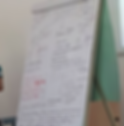What does it mean for children if the only narratives they encounter in school of people from the African continent are about slavery, poverty, or migrants dying in the Mediterranean? How can broad identification be ensured if we do not dare to break with whiteness as the norm in novels about love and teenage life? These and other uncomfortable questions fuel Mette Toft Nielsen’s engagement to bring more awareness to issues of representation in the Danish curriculum. As a secondary school teacher, she noticed how Eurocentric many teaching materials are. Therefore, she started to develop alternatives in her spare time, engaging People of Colour (PoC), teachers, students, and policy makers in the process.

Deconstructing colonial narratives in teaching materials
One of the ways Mette frames her approach is as ‘deconstructing the curriculum’. Deconstruction refers to the action of breaking something into separate parts with the purpose of understanding their deeper meaning and examining the reality they create. By zooming in on widely used teaching materials, primarily aimed at cultural subjects, English, and Danish, she uncovers and challenges underlying narratives rooted in a colonial mindset. This forms the starting point for a range of activities, aimed at challenging the status quo and generating suggestions for how to create broader representation through diverse stories. Together, these feed into the development of a toolkit for teachers.
Involving different stakeholders
Embodying an ethos of inclusivity, Mette involves different groups of people. For each group, she uses a different kind of framing. She works with teachers, looking at concrete examples in the materials they use in their classes, critically reflecting on the messages they bring across – often unconsciously, and asking them how they could do things differently. Here, she frames her work as looking at issues of representation. She is also developing workshops for PoC, with the aim of asking them what they would like to see differently in education. In this context, she talks about decolonisation. In her own lessons she engages pupils in activities that make structural issues such as inequality and privilege relatable through embodied experiences.

When I asked her about people’s responses, she explained that whereas children are quite open-minded, adults tend to be more critical and defensive. “What is interesting is that children hear what you say, whereas adults hear what they think you are saying. They read between the lines, and then they interpret based on that. This is where the defensiveness comes. For example, my experience is that when I address whiteness, adults get very defensive, and they hear that I am calling them out as racists. Children don’t necessarily do that. With them, you can challenge power hierarchies much better, because they are not aware of them in the way that adults are.” How to best work with adults, enabling them to feel the discomfort without shutting down and retracting in defence, taking on a new perspective instead, is one of Mette’s ongoing questions.
Mette reaches out to a wider audience through her blog Dekonstruer (English: Deconstruct), which is part of a website by and for teachers. She also tries to get anti-racism and anti-discrimination policies implemented in schools, working with the local authorities through the management of her school. Whilst the current political climate is a challenge, there is also a lot of support for her work. “When I started working as a teacher, I became aware of the problem of Eurocentrism in teaching materials. This is not only an issue in Western countries, it is an issue all over the world. That is because the way we know teaching today is basically derived from a British tradition. In Denmark, teaching materials with a sincere focus on diversity – that go beyond how ‘diversity’ is being framed from a majority perspective – do not exist. I have tried several times to reach out to established publishing houses and tell them about the problem, but they don’t really seem to care about it. However, I have the support of my colleagues, of teachers, and of people in education departments in universities. There is in fact a lot of support in the society at large, and there is interest all around me. Therefore, I feel that if there was this material, it would not only be me using it, there would be a lot of people using it.”
A societal restructuring of the way we think
Whether people agree or disagree with her, Mette hopes that through her work, people will get to recognise their blind spots and arrive at some new insights. “I realise that it is difficult, because as soon as people leave the learning processes I try to engage them in, they walk into the world as it has always been. But I do hope that they get to reflect and that I manage to challenge the way they think about the world – and I think I do – so that when they go out, they can begin to recognise the issues we talked about. I also hope for the children that are in a racialised ethnic minority position that it gives them a space to breathe. That they feel seen and heard and that their feelings are being acknowledged. On the longer term, I hope that it will enable the students to be in the world differently. (…) I think it is important that children get to see different narratives, and that also adults become aware of this Eurocentric approach that we have to teaching at the moment. Therefore, I see the work I do as contributing to a societal restructuring of the way we think.”
If you would like to find out more, of if you are interested in connecting or collaborating with Mette, you can get in touch by writing to metttoft@gmail.com